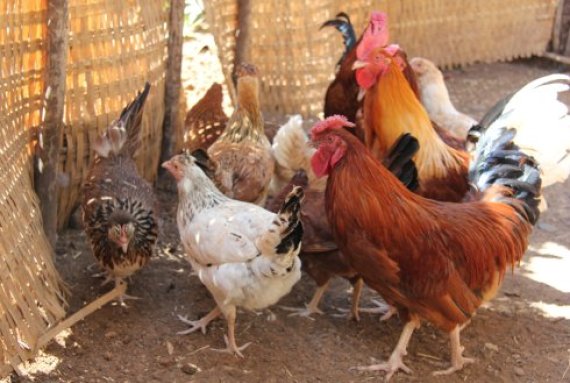A Wageningen research dating from 2010 that was led by Johan van Arendonk, professor of Animal Breeding and Genetics at the time, will form the basis for this new research. Van Arendonk has since become the head of R&D at Hendrix Genetics.
Between 2006 and 2010, Wageningen PhD candidate Nigussie Mullu performed a study among villagers in Ethiopia, under Van Arendonk’s supervision. He inquired what their requirements were for free-range chickens. The population wanted chickens with meat on their bones, which both lay eggs and are fit for consumption. Furthermore, the chickens had to be able to deal with the local parasites. Mullu, researcher at the Ethiopian Institute of Agricultural Research, developed a breeding programme to select this chicken.
Horro
A second Ethiopian PhD candidate, Wondmeneh Esatu, subsequently went on to develop a local race based on the Horro. He compared the local Horro with the European Horro, a commercial chicken from Hendrix Genetics, and with the local chickens. His Horros clearly fared better in the villages than the local chickens from outside the programme. The conclusion was that his breeding programme worked. However, the local Horro was not much better than the European, and so further tweaking of the productive and robust chicken was required.
In 2015, the Gates Foundation awarded 15 million euros to the International Livestock Research Institute in Ethiopia which, with the assistance of the Animal Breeding and Genetics chair group, breeds and distributes improved Horro chickens to three thousand households in three African countries.
An important challenge therein was upscaling the field experiment from several dozen to thousands of households in Ethiopia, Nigeria and Tanzania. ‘The chickens must be provided together with proper instructions, otherwise the production might disappoint’, advised the Wageningen supervisor Liesbeth van der Waaij.
Follow-up
The current award from the Gates Foundation is technically a follow-up of this project. The Gates Foundation asked Hendrix Genetics to further improve the local Horro chicken, which already satisfies several important requirements. Hendrix also needs to develop a stable system to provide sufficient parent animals, in order to avoid any risks to the supply in the event of calamities, such as an outbreak of the avian flu.
Furthermore, the breeding company will also contribute to the further growth of the Horro programme to reach additional small farmers in several countries. Just like the Gates Foundation, Hendrix is investing 9 million euros into this project. Van Arendonk hopes to have a return on this investment later, with the supply of productive free-range chickens in Africa.

 Photo: Wondmeneh E. Woldegiorgiss, Wageningen University
Photo: Wondmeneh E. Woldegiorgiss, Wageningen University